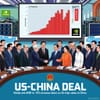The Trump administration has struck a deal with Nvidia and AMD, requiring them to pay a 15% revenue tax on AI chip sales to China. This unprecedented agreement allows both companies to maintain access to the Chinese market while generating revenue for the US government. The deal grants both companies export licenses for their China-specific AI chips, including Nvidia's H20 and AMD's MI308.
The agreement could unlock billions in annual revenue for Nvidia and AMD, with estimates suggesting $23 billion in potential sales for Nvidia's H20 chips in China. However, critics argue that the deal undermines national security by enabling China's AI capabilities and reflects a troubling trend of government intrusion into the private sector.
China may accelerate domestic chip development, potentially reducing US market share in the AI hardware sector by 20-30%. The deal may set a precedent for other high-tech sectors, such as aerospace and quantum computing, and could lead to further erosion of the export control regime.
According to Ray Wang, a semiconductor researcher at the Futurum Group, the government's 15% cut is an "opportunity to raise government revenue" and part of a broader trade negotiation between the US and China. Jennifer Lind, an associate professor at Dartmouth University, argues that the deal suggests the Trump administration is prioritizing economic dealmaking over national security concerns.


